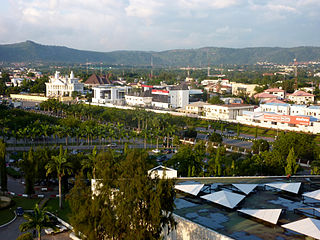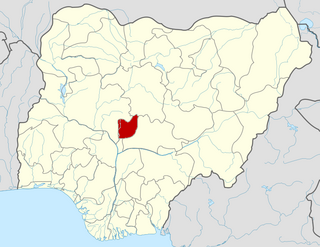
Abuja is the capital and eighth most populous city of Nigeria. Situated in the middle of the country within the Federal Capital Territory (FCT), it is a planned city built mainly in the 1980s based on a master plan by International Planning Associates (IPA), a consortium of three American planning and architecture firms made up of Wallace, Roberts, McHarg & Todd as the lead, Archi systems International, and Planning Research Corporation. The Central Business District of Abuja was designed by Japanese architect Kenzo Tange. It replaced Lagos, the country's most populous city, as the capital on 12 December 1991.
The term federal district refers to specific administrative divisions in various federations. These districts may be under the direct jurisdiction of a federation's national government, as in the case of federal territory, or they may function as ordinary federated units. Federal districts often include capital districts.

Nigeria is a federation of 36 states. Each of the 36 states is a semi-autonomous political unit that shares powers with the federal government as enumerated under the Constitution of the Federal Republic of Nigeria. The Federal Capital Territory (FCT), is the capital territory of Nigeria, and it is in this territory that the capital city of Abuja is located. The FCT is not a state. It is a territory of the Federal Government, administered by Ministers of Government appointed by the President who supervises by the administration of the territory. Each state is subdivided into local government areas (LGAs). There are 774 local governments in Nigeria. Under the constitution, the 36 states are co-equal but not supreme because sovereignty resides with the federal government. The constitution can be amended by the National Assembly, but each amendment must be ratified by two-thirds of the 36 states of the federation.

Kogi State is a state in the North Central region of Nigeria, bordered to the west by the states of Ekiti and Kwara, to the north by the Federal Capital Territory, to the northeast by Nasarawa State, to the northwest by Niger State, to the southwest by the Edo and Ondo states, to the southeast by the states of Anambra and Enugu, and to the east by Benue State. It is the only state in Nigeria to border ten other states. Named for the Hausa word for river (Kogi). Kogi State was formed from parts of Benue State, Niger State, and Kwara State on 27 August 1991. The state is nicknamed the "Confluence State" due to the fact that the confluence of the River Niger and the River Benue occurs next to its capital, Lokoja.
ISO 3166-2:NG is the entry for Nigeria in ISO 3166-2, part of the ISO 3166 standard published by the International Organization for Standardization (ISO), which defines codes for the names of the principal subdivisions of all countries coded in ISO 3166-1.

Lagos State is a state in southwestern Nigeria. Out of the 36 states, it is the second most populous state and the smallest in area. Bounded to the south by the Bight of Benin and to the west by the international border with Benin for ten km, Lagos State borders Ogun State to the north for about 283 km, making it the only Nigerian state to border only one other state. Named for the city of Lagos—the most populous city in Africa—the state was formed from the Western Region and the former Federal Capital Territory on 27 May 1967.
A federal capital is a political entity, often a municipality or capital city, that serves as the seat of the federal government. A federal capital is typically a city that physically encompasses the offices and meeting places of its respective government, where its location and relationship to subnational states are fixed by law or federal constitution. Federal capitals may or may not be considered states in themselves, and either exercise significant political autonomy from the federation or are directly ruled by the national government located within their premises, as federal districts.

The Federal Capital Territory (FCT) is a federal territory in central Nigeria. Abuja, the capital city of Nigeria, is located in this territory. The FCT was formed in 1976 from parts of the states of old Kaduna, Kwara, Niger, and Plateau states, with the bulk of land mass carved out of Niger state. The Federal Capital Territory is within the North Central region of the country. Unlike other states of Nigeria, which are headed by elected Governors, it is administered by the Federal Capital Territory Administration, headed by a minister, who is appointed by the president.
A capital district, capital region, or capital territory is normally a specially designated administrative division where a country's seat of government is located. As such, in a federal model of government, no state or territory has any political or economic advantage relative to the others because of the national capital lying within its borders. A capital territory can be a specific form of federal district.

Nasarawa State is a state in the North Central region of Nigeria, bordered to the east by the states of Taraba and Plateau, to the north by Kaduna State, to the south by the states of Benue and Kogi, and to the west by the Federal Capital Territory. Named for the historic Nasarawa Emirate, the state was formed from the west of Plateau State on 1 October 1996. The state has thirteen local government areas and its capital is Lafia, located in the east of the state, while a key economic centre of the state is the Karu Urban Area—suburbs of Abuja—along the western border with the FCT.
Aliyu Modibbo Umar is a Nigerian technocrat who was the federal Minister of State for Power and Steel from December 2002 to May 2003, Minister of Commerce from July 2006 to July 2007, then Minister for the FCT, a post he held until October 2008.
Kwali is a local government area in the Federal Capital Territory in Nigeria.
The Federal Capital Territory Administration (FCTA) is a Nigerian ministry that administers the Federal Capital Territory of Nigeria. It is headed by a Minister, who is appointed by the President, and assisted by a Permanent Secretary, who is a career civil servant.
The table below lists Nigerian senators of the 6th National Assembly. The 6th National Assembly (2007–2011) was inaugurated on 5 June 2007. The Senate includes three senators from each of the 36 states, plus one minister for the Federal Capital Territory, Abuja. Of the 109 Senators, 26 were re-elected while 83 were elected for the first time. David Mark was appointed president of the Senate and Ike Ekweremadu deputy president.
Philips Tanimu Aduda is a Nigerian politician. He served two terms in the Nigerian House of Representatives between 2003 and 2011, and was elected to the Senate for the Abuja Federal Capital Territory in the 9 April 2011 elections, running on the People's Democratic Party (PDP) ticket.
Mohammed Musa Bello is a Nigerian banker and politician who served as the Minister of the Federal Capital Territory, from 2015 to 2023.








